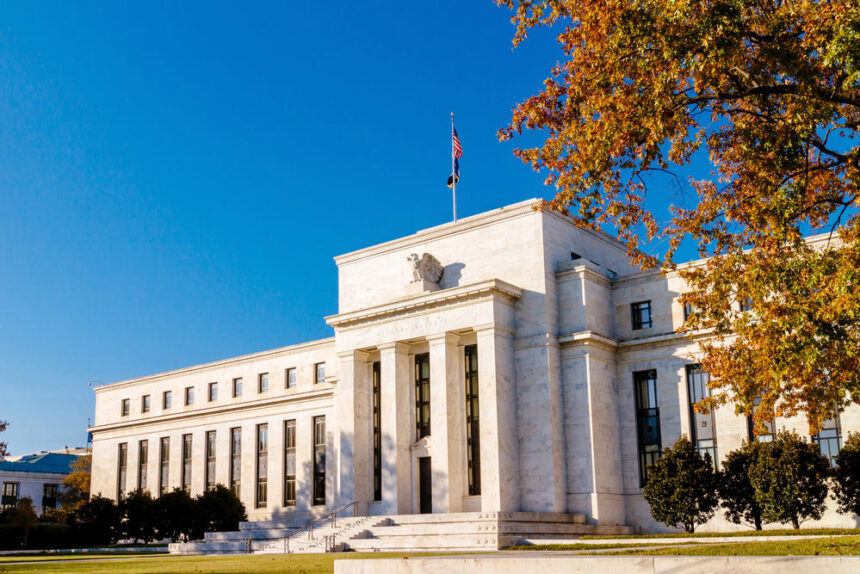The US Federal Reserve decided to keep its benchmark interest rate unchanged for the third consecutive meeting, signalling that it will take a cautious approach until there is more clarity on the economic impact of President Donald Trump’s trade policies. The Federal Open Market Committee (FOMC) voted unanimously to maintain the federal funds rate within the range of 4.25% to 4.50%. This move comes as the central bank closely monitors the effects of tariffs and trade policies, particularly President Trump’s aggressive tariff measures.
In its statement, the Fed highlighted growing risks to its inflation and employment targets, pointing to the potential economic fallout from rising tariffs. The central bank also mentioned that recent “swings in net exports” had not noticeably impacted overall economic activity, though it acknowledged that a surge in imports preceding the tariff measures could have far-reaching consequences for the economy.
Read More: Canada’s Trade Shifts Away from US Amid Tensions, Exports to Other Nations Surge
The decision was largely anticipated by market experts, who had been waiting to see whether the Federal Reserve would shift its stance on monetary policy in response to the administration’s trade actions. With uncertainty surrounding global trade, the Fed’s careful stance is aimed at avoiding any premature decisions that could worsen the situation.
“The tariff situation is extremely fluid and unpredictable; therefore, it would be irresponsible for the Fed to attempt to respond to tariffs when the situation can change drastically, potentially rendering their actions ineffective or even exacerbating the negative effects,” said Chris Brigati, Chief Investment Officer at SWBC.
The Federal Reserve’s decision comes in the wake of heightened trade tensions, particularly following President Trump’s decision to impose hefty tariffs on Chinese imports. In addition, a 10% levy was introduced on goods from many other countries, triggering a period of market volatility as investors struggled to gauge the potential impact on global trade and economic stability.
Despite these challenges, the Fed’s assessment of the broader economic picture suggests that the tariffs have not yet led to major disruptions in domestic growth. However, the uncertainty surrounding trade policies is contributing to a volatile economic climate, which could have far-reaching effects on global financial markets. The White House has also announced that higher tariffs on several other trading partners will be delayed until July, providing time for renegotiating trade deals that could help mitigate some of the risks.
Recent economic data has shown signs of a potential slowdown, with some indicators pointing to a contraction in the first quarter of the year. Despite this, the US economy continues to benefit from a strong labour market, as the unemployment rate remains near historic lows. Additionally, inflation appears to be on track to align with the Federal Reserve’s long-term target of 2%, which has helped ease concerns about runaway price growth.
Also Read: Trump’s Tariffs Strangle US Ports as Shipments Plummet
While the Fed has made it clear that it is committed to keeping inflation in check, it is also wary of the unpredictable nature of President Trump’s trade policies. The central bank has emphasized that it will continue to monitor the situation closely, adjusting its monetary policy if necessary to ensure that inflation and employment targets are met.
The ongoing trade war, particularly with China, has become a key focus for economic policymakers. Analysts are warning that a prolonged period of elevated tariffs could undermine business confidence and slow down global economic growth. In the coming months, the Fed’s approach to interest rates will likely depend on whether the trade tensions escalate or if a resolution is reached through diplomatic negotiations.
Conclusion
The Federal Reserve’s decision to keep interest rates steady reflects its cautious approach to the current economic uncertainty. While recent data suggests that the US economy remains resilient, policymakers are closely watching the impact of tariffs on inflation and employment. With the trade war still unfolding, the Fed is likely to remain vigilant, ready to adjust its policy as needed to navigate the risks posed by President Trump’s tariffs.
Follow 10X Times for latest business news updates.






